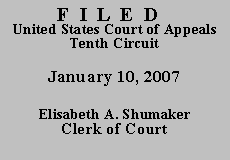

| UNITED STATES OF AMERICA,
Plaintiff-Appellee, v. ROBERT B. SULLIVAN, Defendant-Appellant. |
(D.C. No. 03-CR-00210-MSK and 04-CV-02088-MSK)
|
The defendant appeals the district court's denial of his post-judgment motion in which he sought relief under Fed. R. Civ. P. 60(b) from his criminal conviction and sentence. We vacate the order for lack of jurisdiction, construe the defendant's notice of appeal, motion to proceed in forma pauperis, and appellate brief as an implied application for authorization to file another 28 U.S.C. § 2255 motion, and deny authorization.
The defendant was convicted, following a jury trial of being a felon in possession of a firearm. His conviction and sentence were affirmed on appeal. United States v. Sullivan, 108 Fed. Appx. 579 (10th Cir. 2004) (unpublished), cert. denied, 543 U.S. 1077 (2005). The defendant's original § 2255 motion was denied by the district court and, on appeal, this court denied a certificate of appealability. United States v. Sullivan, 180 Fed. Appx. 10 (10th Cir. 2006) (unpublished).
The defendant subsequently filed, in the district court, a pleading entitled "Motion to Vacate - Under Fed. R. Civ. P. 60(b)(3)(4) by Restricted Appearance and Special Visitation" and another pleading entitled "Amended Notice of Motion to Vacate Fed. R. Civ. P. 60(b)(3)(4)." In the motions he alleged that the judgment entered against him was based on fraud and was void ab initio. He contended that the United States of America has no standing to prosecute, that only the United States has such standing, and that they are two separate entities. He also argued that a fraud was perpetrated because the jurisdiction of the court was under admiralty maritime jurisdiction and was not a criminal action as was represented to him.
The district court denied the motions as an unauthorized successive § 2255 motion. The defendant then filed this appeal.
On appeal, the defendant challenges the judgment on the same grounds raised in the district court. The relief sought by the defendant may only be obtained through § 2255. See 28 U.S.C. § 2255 ("A prisoner in custody under sentence of a court established by Act of Congress claiming the right to be released upon the ground that ... the court was without jurisdiction to impose such sentence ... may move the court which imposed the sentence to vacate, set aside or correct the sentence.").
Because the defendant has already filed a § 2255 motion and a judgment has been entered in that proceeding, he must obtain authorization from this court before he may file another such motion in the district court. See United States v. Nelson, 465 F.3d 1145, 1147 (10th Cir. 2006) (a pleading asserting a new ground for relief is advancing a new claim and is therefore treated as a successive § 2255 motion under Gonzalez v. Crosby, 545 U.S. 524 (2005)).
Accordingly, the district court lacked jurisdiction over the defendant's post-judgment motions, and the district court order must be vacated. See Nelson, 465 F.3d at 1146. However, we will construe the defendant's notice of appeal and the pleadings he filed in this court as a request for the required authorization. Id. at 1148.
We have thoroughly reviewed the matter and conclude that the defendant has failed to make the prima facie showing required by § 2255 as amended by the Antiterrorism and Effective Death Penalty Act. His contentions are not based on newly discovered evidence that, "if proven and viewed in light of the evidence as a whole, would be sufficient to establish by clear and convincing evidence that no reasonable fact finder would have found [him] guilty of the offense" or on a "new rule of constitutional law, made retroactive to cases on collateral review by the Supreme Court, that was previously unavailable." 28 U.S.C. § 2255.
The motion to proceed in forma pauperis is granted, the district court order is VACATED, and the implied application for authorization to file another § 2255 motion is DENIED. The mandate shall issue forthwith.
Entered for the Court
Per Curiam
*. This order and judgment is not binding precedent, except under the doctrines of law of the case, res judicata, and collateral estoppel. It may be cited, however, for its persuasive value consistent with Fed. R. App. P. 32.1 and 10th Cir. R. 32.1.